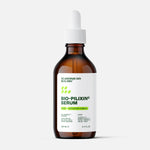Menopause is a significant phase in a woman's life, marked by a variety of changes, both physical and emotional. Among these changes, alterations in hair texture and moisture levels can be particularly challenging.
Many women experience dry hair during menopause, a condition that can affect their self-esteem and overall well-being.
In this blog post, we delve into the causes of dry hair during menopause and offer expert care tips to manage and rejuvenate your locks.
Whether you're looking for ways to restore hydration, improve texture, or simply understand the changes your body is undergoing, this guide aims to empower you with knowledge and practical solutions.
Join us as we explore the journey through menopause with a focus on maintaining healthy, vibrant hair.
Table of content
Understanding menopause-related hair changes

It's a common misconception that hair loss or thinning is solely a concern for men; however, women also face these challenges, especially during their middle-aged years. This period often aligns with menopause, a time when the body undergoes significant hormonal shifts.
The primary culprit behind these hair changes is the decrease in estrogen levels. Estrogen, a hormone prevalent in younger women, plays a vital role in maintaining hair's strength and vitality.
During menopause, as estrogen levels drop, many women notice their hair becoming less full and less lustrous. This change can be a source of distress, affecting one's self-image and confidence.
However, it's crucial to note that complete baldness due to menopause is rare. The hair thinning experienced during this phase is often more subtle and manageable. There are numerous effective strategies to combat these changes, ranging from medical interventions to lifestyle adjustments and cosmetic solutions.
As your leading source for hair health information over the past 4 years, we never compromise on accuracy. When it comes to your health, you deserve information you can truly rely on - and earning your trust is our top priority.
Here's how Scandinavian Biolabs ensures every piece of content meets the highest standards of accuracy and integrity:
- Credentialed Experts: Our reviewers are actively practicing doctors and medical researchers
- Stringent Reviews: Content undergoes rigorous editing by subject specialists and review by a practicing doctor.
- Evidence-Based: We rely on well-established research from trusted scientific sources like peer-reviewed journals and health authorities.
- Full Transparency: Our editorial standards, writer credentials, reviewer credentials, correction process, and funding are all publicly documented.
- Independent Voice: While we do promote products, we operate in a vacuum to business operations. Our main goal is just an unwavering commitment to providing medically-sound guidance.
You can count on Scandinavian Biolabs to consistently deliver the trustworthy health information you deserve. Read our Editorial Standards.
How do you fix dry hair from menopause?
To fix dry hair from menopause, focus on hydrating and nourishing your hair. Use a mild, moisturizing shampoo and a rich conditioner. Incorporate weekly deep conditioning treatments and consider using natural oils like argan or coconut oil to lock in moisture. Limit heat styling and chemical treatments.
Also, ensure a healthy diet rich in vitamins and omega-3 fatty acids, and stay hydrated by drinking plenty of water. If necessary, consult a dermatologist for specialized treatments or supplements that can help address hormonal changes affecting your hair.
Expert care tips for managing dry hair in menopause
Managing dry hair during menopause can be effectively tackled with a combination of proper hair care and lifestyle adjustments. These expert tips can help in maintaining healthy, hydrated hair:
1. Bio-Pilixin Serum

The Bio-Pilixin Activation Serum offers a targeted solution for dry hair and hair loss during menopause. Clinically proven to show results in just 45 days, it combines plant growth factors developed through stem cell technology to nurture hair follicles and encourage growth.
Key ingredients include Capilia Longa for reducing hair loss, Niacinamide for strengthening hair, and Vanillyl Butyl Ether for improving scalp blood flow.
This vegan, drug-free formula is safe for daily use, making it an ideal choice for those seeking a natural approach to enhance hair health and density in menopause.
2. Use hydrating hair products
Choose shampoos and conditioners specifically formulated for dry hair. Look for products containing hydrating ingredients like glycerin, hyaluronic acid, or natural oils.
3. Limit heat styling
Reduce the use of hair dryers, straighteners, and curling irons. When necessary, use a heat protectant spray. When heat styling is necessary, always use a heat protectant spray to minimize damage and maintain hair health.
4. Deep conditioning treatments
Regularly use deep conditioning masks or treatments to provide extra moisture and nutrients to your hair. This can help restore the hair's natural shine and elasticity, which is often lost during menopause.
5. Natural oils
Incorporate natural oils like argan, coconut, or jojoba oil into your routine to nourish and moisturize your scalp and hair. These oils can also promote a healthier scalp environment, encouraging hair growth and reducing dryness.
6. Balanced diet
Eat a balanced diet rich in vitamins, minerals, and omega-3 fatty acids to support hair health from the inside. Foods like fish, nuts, and leafy greens can significantly contribute to the overall health and appearance of your hair.
7. Gentle hair practices
Avoid tight hairstyles and minimize brushing when hair is wet to reduce breakage. When hair is wet and more vulnerable, minimize brushing or combing to prevent unnecessary hair loss and damage.
8. Consult a specialist
If hair dryness persists, consider consulting a dermatologist or trichologist for personalized advice or treatment options. They can offer personalized advice or treatment options based on the specific needs of your hair and scalp, especially during menopause.
Home remedies for menopause hair thinning
Menopause hair thinning can often be managed with simple, natural home remedies that nurture and strengthen hair. These remedies focus on providing essential nutrients directly to the scalp and hair, promoting a healthier hair growth cycle.
Massage with essential oils
Regular scalp massages using essential oils like rosemary or peppermint can stimulate hair growth and improve circulation.
Aloe vera treatment
Aloe vera is known for its soothing and moisturizing properties. Apply it to the scalp to balance pH levels and promote hair health.
Nutrient-rich diet
A diet rich in vitamins, minerals, and proteins, especially biotin and omega-3 fatty acids, can support hair health from the inside out.
Gentle styling
Minimize hair damage by avoiding tight hairstyles and reducing heat styling and harsh chemical treatments.
Natural hair masks
Use homemade masks made from ingredients like eggs, avocado, or banana to nourish and strengthen hair.
Stay hydrated
Drinking plenty of water helps to keep both the body and hair hydrated, which is crucial for maintaining hair health.
Will my hair go back to normal after menopause?

After menopause, some women may experience a partial recovery in hair texture and thickness, but it largely depends on individual factors like genetics and overall health. While menopausal hair changes are often permanent, proper care and treatment can significantly improve hair health and appearance.
Establishing a routine that includes a balanced diet, proper hair care, and possibly medical interventions can help in managing these changes effectively.
Conclusion
Navigating the hair changes during menopause can be a challenging yet manageable journey. The key lies in understanding the hormonal shifts that occur during this phase and adapting your hair care routine accordingly.
From using specialized products like the Bio-Pilixin Activation Serum from Scandinavian Biolabs, which aids in nurturing hair follicles and encouraging growth, to embracing natural and gentle hair care practices, there are numerous ways to combat dryness and thinning.
Remember, the importance of a balanced diet and staying hydrated cannot be overstated in maintaining overall hair health.
Home remedies and regular treatments with natural oils and deep conditioning masks can also play a significant role in revitalizing your hair.
While some changes in hair texture and thickness may be permanent post-menopause, adopting these expert care tips can lead to noticeable improvements. It's essential to approach these changes with patience and care.
Consulting with a specialist for personalized advice can further tailor your approach to your unique hair needs.
FAQs
How can I moisturize my hair during menopause?
Use a gentle, moisturizing shampoo and conditioner formulated for dry or damaged hair to improve elasticity. Incorporate a weekly hair mask, such as one made with egg and olive oil, or hot oil treatments, to deeply nourish your hair.
What can I do to thicken my hair post-menopause?
Apply minoxidil 5% foam daily to combat age-related thinning. Supplement your diet with biotin, collagen, and vitamin C to nourish your hair. Use thickening shampoos and keratin masks for added volume. Avoid excessive heat styling or brushing to reduce breakage.
Are there any home remedies to improve hair health during menopause?
Yes, home remedies like egg and olive oil masks can be effective. These natural ingredients deeply condition and strengthen the hair, helping to restore moisture and improve overall hair health during menopause.
References
Read more







